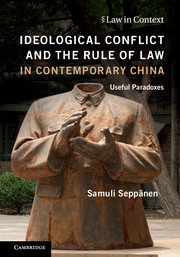Book contents
- Frontmatter
- Dedication
- Contents
- Foreword
- Preface and acknowledgments
- 1 Introduction
- 2 Setting the stage
- 3 Ideological cynicism meets theoretical skepticism
- 4 Useful paradoxes: the conservative socialist ideological position
- 5 Thick mainstream, thin liberalism and vice versa
- 6 Avant-garde renewal and nostalgia
- 7 Conclusions
- Textbook answers to the questions in Chapters 1–6
- Bibliography
- Index
2 - Setting the stage
Published online by Cambridge University Press: 05 July 2016
- Frontmatter
- Dedication
- Contents
- Foreword
- Preface and acknowledgments
- 1 Introduction
- 2 Setting the stage
- 3 Ideological cynicism meets theoretical skepticism
- 4 Useful paradoxes: the conservative socialist ideological position
- 5 Thick mainstream, thin liberalism and vice versa
- 6 Avant-garde renewal and nostalgia
- 7 Conclusions
- Textbook answers to the questions in Chapters 1–6
- Bibliography
- Index
Summary
Law primarily embodies the will of:
A.The entire society.
B.The ruling class.
C.The Party.
D.The whole people.
– Preparatory Material for the Public Examination for the Recruitment of Provincial (City and County) Level Public Institution Staff, 21.Three generations of Chinese legal scholars
This chapter places the four ideological positions of Chinese rule of law scholarship into a historical and political context. At the outset it must be recognized that there is no single way to map the different ideological positions in Chinese legal thought. Chinese scholars are nearly unanimous in their belief that no “schools of thought” (学派) exist in China. At the same time, a number of Chinese scholars believe that there are specific research “paradigms” (范式) within Chinese legal academia. The distinction between the two concepts is categorical to many Chinese scholars, but its meaning appears to be one of degree. “Schools of thought” suggest more permanent and stronger institutional divisions than do “paradigms.” The paradigms within Chinese legal academia are usually defined with reference to notable legal scholars: the names Zhu Suli and He Weifang often come up, for instance. Professor He Weifang's name generally stands for the wholesale reception of Western legal institutions (such as strengthened constitutionalism). Professor Zhu Suli forms the counterpoint to He Weifang's liberalism. Zhu is best known for his concept of “native resources” and his application of various aspects of Richard Posner's legal thought to the Chinese context. Other names come up more randomly. In addition to the scholars on whom this book provides specific sections (Cui Zhiyuan, Deng Zhenglai, Gao Hongjun, Ji Weidong, Jiang Shigong, Li Buyun, Wang Liming and Xia Yong), these include, among dozens of others, Cai Dingjian, the late liberal-leaning constitutional scholar; Liang Zhiping, an advocate of cultural explanations of law; and a number of other scholars such as Chen Duanhong, Ling Bin and Zhao Xiaoli. The bêtes noires for liberal and mainstream Chinese scholars are China's conservative socialist leaders and the most vocal of the neoconservative scholars. In the background of the academic discourse is the official dogma of the CCP.
- Type
- Chapter
- Information
- Ideological Conflict and the Rule of Law in Contemporary ChinaUseful Paradoxes, pp. 27 - 51Publisher: Cambridge University PressPrint publication year: 2016



